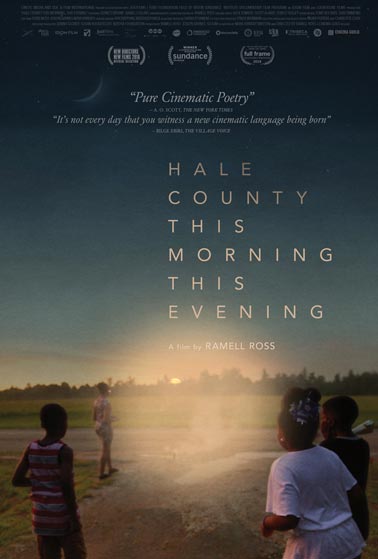Hale County This Morning This Evening (2018)


SHOULD I SEE IT?
YES
RaMell Ross’ debut film is an unconventional documentary with many lasting moments and images to carry with viewers long after the movie’s conclusion.
Fans of the observational camera technique of documentary filmmaking will appreciate the influences of Frederick Wiseman, Barbara Kopple, and others, though Ross makes the film distinctly his own.
Poetic, hypnotic at times, Ross creates an essay on small town African-American life that not only speaks to representation on screen, but illuminates the struggles small communities and small counties have maintaining sustainability.
NO
The way this is constructed (no narration, slice of life footage, long takes) will be a challenge for viewers who like conventional narratives and structure.
Spanning five years, Hale County… may seem too unwieldy and far-ranging for some viewers.
Documentaries about daily lives, or those lacking a specific issue of focus, are a struggle for you to get interested in.
OUR REVIEW
With a visual poetry, amid a mosaic of images, scenes, and personal observations that can prove as polarizing to viewers as enthralling, RaMell Ross’ astonishing debut film, Hale County This Morning This Evening, returns to theaters in January 2019, hoping to sneak into the Oscar race as a nominee for Best Documentary Feature. Ross’ debut film, shot over a five-year span in the storied, but small Alabama county, offers a tapestry of African-American life, stitched together in a cinema vérité-style, with occasional title cards to guide us through the film.
Hired as a local basketball coach in 2009, Ross took his love of photography and filmmaking to new heights when he began filming a little (or a lot) each day possible, compiling all that material into a crisp, concise 76-minute experience. Unflinching, raw, and honest, Hale County This Morning This Evening becomes a glimpse into a small, low income community, where its citizens struggle each and every day to survive and/or get out of their present surroundings.
Hale County, south of Tuscaloosa, is a county of approximately 16,000 people, with a median income of approximately $25,000 per household. With nearly 60% of its citizens African-American, the county did not see representation reflective of their population until 1997, when the first black mayor was elected. Named after a Confederate officer, Steven Hale, in 1867, the county has seen increased poverty and economic hardship over the years, with an inability to sustain business and industry.
Through this lens, we can bear witness to Ross’ scenes of daily life. Two young men: Daniel, a basketball hopeful attending Selma University, and Quincy, a young father and husband, expecting twins, move into focus, but as we get to know them better, the happenings in and around them provide a greater, and admittedly more abstract, context to what they experience each day.

One interesting element to the film is the inclusion of creative advisor Apichatpong Weerasethakul, the inventive and groundbreaking director from Thailand, whose films like Uncle Boonmee Who Can Recall His Past Lives and Ceremony of Splendor, have left audiences exasperated or excited in equal measure, by his vision and unique reconstruction of cinematic storytelling.
Ross and “Joe” (Weerasethakul’s nickname) make an intriguing team, and while it is hard to know where Joe’s influence comes into play, Hale County has a very deliberate pace, even when footage is sped up, altered, or otherwise reconfigured for visual and narrative amplification.
Ross’ film, along with the films made by the legendary Frederick Wiseman, as well as those of Barbara Kopple, The Mayseles Brothers, Kirby Dick, and others, can run the risk of being exploitative; inasmuch as sticking cameras into situations and making us feel as if we are turning over rocks and studying people and situations in an exaggerated or heightened state of reality. There’s a purity Ross taps into however, even when his subjects acknowledge or speak to the camera directly, which make it stand tall with the best of the films which adopt this approach and technique.
Intoxicating, occasionally challenging, but meticulously pieced together and painstakingly produced, Hale County This Morning This Evening proves to be a fascinating visual scrapbook of people simply trying to find their way; perpetually worried and aware that they could be left behind, no matter how hard they strive to overcome the obstacles placed before them.
CAST & CREW
Documentary Featuring: Quincy Bryant, Daniel Collins, Latrenda Ash
Director: RaMell Ross
Written by: RaMell Ross, Maya Krinsky
Release Date: September 14, 2018
The Cinema Guild
